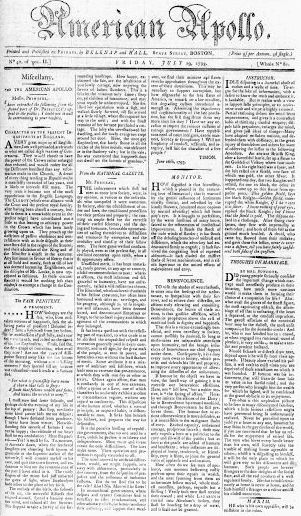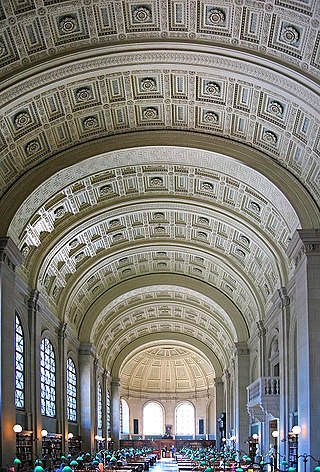
Benjamin Banneker was an African-American naturalist, mathematician, astronomer and almanac author. A landowner, he also worked as a surveyor and farmer.

The Boston Public Library is a municipal public library system in Boston, Massachusetts, founded in 1848. The Boston Public Library is also Massachusetts' Library for the Commonwealth, meaning all adult residents of the state are entitled to borrowing and research privileges, and the library receives state funding. The Boston Public Library contains approximately 24 million items, making it the third-largest public library in the United States behind the federal Library of Congress and New York Public Library, which is also privately endowed. In 2014, the library held more than 10,000 programs, all free to the public, and lent 3.7 million materials.

John Trumbull was an American artist of the early independence period, notable for his historical paintings of the American Revolutionary War, of which he was a veteran. He has been called the "Painter of the Revolution".

The Boston Common is a public park in downtown Boston, Massachusetts. It is the oldest city park in the United States. Boston Common consists of 50 acres (20 ha) of land bounded by Tremont Street, Park Street, Beacon Street, Charles Street, and Boylston Street.

Charles Bulfinch was an early American architect, and has been regarded by many as the first American-born professional architect to practice.

Jeremy Belknap was an American clergyman and historian. His great achievement was the History of New Hampshire, published in three volumes between 1784 and 1792. This work is the first modern history written by an American, embodying a new rigor in research, annotation, and reporting.

Winthrop Sargent was a United States patriot, politician, and writer; and a member of the Federalist party.

The American Antiquarian Society (AAS), located in Worcester, Massachusetts, is both a learned society and a national research library of pre-twentieth-century American history and culture. Founded in 1812, it is the oldest historical society in the United States with a national focus. Its main building, known as Antiquarian Hall, is a U.S. National Historic Landmark in recognition of this legacy. The mission of the AAS is to collect, preserve and make available for study all printed records of what is now known as the United States of America. This includes materials from the first European settlement through the year 1876.
Zabdiel Boylston, FRS was a physician in the Boston area. As the first medical school in North America was not founded until 1765, Boylston apprenticed with his father, an English-born surgeon named Thomas Boylston, and studied under the Boston physician Dr. Cutler. Boylston is known for holding several "firsts" for an American-born physician: he performed the first surgical operation by an American physician, the first removal of gall bladder stones in 1710, and the first removal of a breast tumor in 1718. He was also the first physician to perform smallpox inoculations in North America.

Boylston Street is a major east–west thoroughfare in the city of Boston, Massachusetts. The street begins in Boston's Chinatown neighborhood, forms the southern border of the Boston Public Garden and Boston Common, runs through Back Bay, and ends in Boston's Fenway neighborhood.

A historical society is an organization dedicated to preserving, collecting, researching, and interpreting historical information or items. Originally, these societies were created as a way to help future generations understand their heritage.

Thomas Boylston Adams was the third and youngest son of second United States president John Adams and Abigail (Smith) Adams. He worked as a lawyer, a secretary to his brother John Quincy Adams while the latter served as United States ambassador to the Netherlands and Prussia, the business manager of and a contributor to the political and literary journal Port Folio, and a Massachusetts chief justice.

Nathan Webb was a teacher, firefighter, and public official in Boston, Massachusetts, in the late 18th and early 19th centuries. He arrived in Boston from Windham, Connecticut around 1783, when he was 16 years old. In 1783, he began work as a teaching assistant at the North Writing School, a public school under the direction of schoolmaster John Tileston, on Love Lane in the North End. Webb continued teaching through 1789. According to his diary (1788-1791), in his young adult years he was active in the Independent Musical Club, a private music club with both male and female members founded in 1789. When George Washington visited Boston in 1789, Webb attended the parade that took place by the triumphal arch on Washington Street.

The American Apollo was a newspaper published in Boston, Massachusetts in the late 18th century, featuring "political and commercial intelligence, and other entertaining matter." It was issued by printer Joseph Belknap, along with Alexander Young and Thomas Hall on State Street. In 1792, the newly formed Massachusetts Historical Society's "collections were at first published in ... the American Apollo. " The newspaper ceased in December 1794.

Ward Nicholas Boylston, a descendant of the physician Zabdiel Boylston, was an American merchant, a philanthropist, and benefactor of Harvard University.

The McKim Building is the main branch of the Boston Public Library at Copley Square in Boston, Massachusetts. The building, described upon its 1895 opening as a "palace for the people", contains the library's research collection, exhibition rooms, and administrative offices. The building includes lavish decorations, a children's room, and a central courtyard surrounded by an arcaded gallery in the manner of a Renaissance cloister. The library regularly displays its rare works, often in exhibits that will combine works on paper, rare books, and works of art. Several galleries in the third floor of the McKim building are maintained for exhibits.
Thomas Boylston Adams was an American business executive, writer, academician, and political candidate.
The Adams Papers Editorial Project is an ongoing project by historians and documentary editors at Massachusetts Historical Society to organize, transcribe, and publish a wide range of manuscripts, diaries, letterbooks and politically and culturally important letters authored by and received by the family of Founding Father John Adams, his wife Abigail Adams and their family, including John Quincy Adams. Over 27,000 records have been catalogued to date. Administrators of the database also track the location and content of Adams related materials at other scholarly institutions. By virtue of its collaborative nature, the project simultaneously sheds light on the lives of John Adams’ fellow Founding Fathers George Washington, John Jay, Benjamin Franklin, Thomas Jefferson, James Madison and Alexander Hamilton.

Tariff of 1791 or Excise Whiskey Tax of 1791 was a United States statute establishing a taxation policy to further reduce Colonial America public debt as assumed by the residuals of American Revolution. The Act of Congress imposed duties or tariffs on domestic and imported distilled spirits generating government revenue while fortifying the Federalist Era.

Ellen Wayles Randolph Coolidge was the granddaughter of Thomas Jefferson and daughter of Martha Jefferson Randolph and Thomas Mann Randolph. Coolidge had a close relationship with Jefferson, serving as an assistant until her marriage.





















